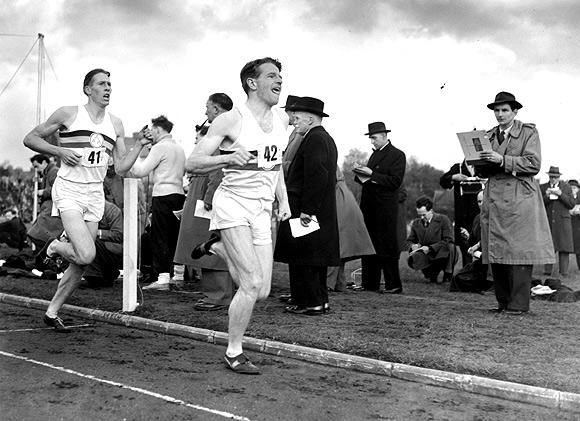
Bikash Mohapatra digs out some of the biggest names in sport who failed to leave a mark on the Olympics.
The Olympics is a great leveler.
While on the one hand we witness athletes rising from relative anonymity to create history, on the other there are eminent athletes who fail to rise to the occasion. As such, Olympics glory remains the lone elusive factor in their otherwise illustrious careers.
From Ron Clarke to Gunder Haag to Jim Peters to Khalid Khannouchi, Olympics history is replete with examples of athletes who faltered on the biggest stage and failed to add a Games title to their glittering resume.
Rediff.com takes a look at a few known names who failed to win the gold medal at the premier sporting extravaganza.
Sir Roger Bannister (Britain)
It is a fact that Sir Roger Bannister was the first man to break the four-minute barrier in the mile.
However, little known is the fact that the legendary British athlete failed at the Olympics.
At 19, he was selected to represent Britain at the 1948 London Games. Bannister, however, declined as he felt he wasn't ready to compete at that level.
His preparation for the subsequent Games in Helsinki was elaborate, though. His preferred event was the now defunct 880 meters. So he was left disappointed when to find out he had to compete in the 1,500 metres at the Finnish capital.
Bannister qualified for the final but could only finish fourth, thereby missing out on the medals. For the record, Josy Barthel won what remains Luxembourg's first and only gold.
The disappointment, though, proved to be the stepping stone for better thing to come. Bannister went on to win the 1,500 meters gold at the Commonwealth Games in Vancouver two years later before progressing to break the four-minute barrier in the mile at the Iffley Road track in Oxford in the same year.
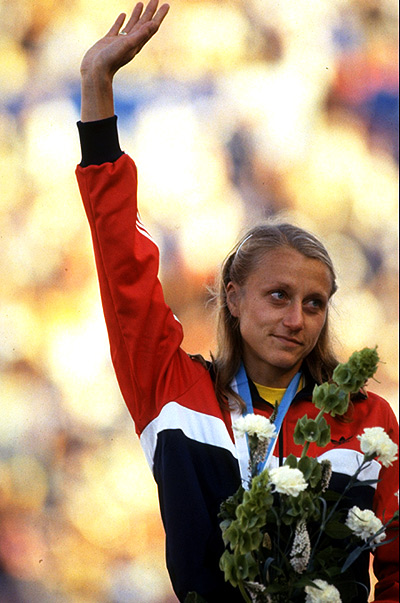
Grete Waitz (Norway)
For starters, Grete Waitz was a world record holder in women's marathon.
Among other things, the Norwegian won the New York marathon on nine occasions between 1978 and 1988, the most by any athlete. Waitz also won gold in her preferred event in the inaugural World championships in Helsinki in 1983.
However, when it came to the Olympics she failed to grab the yellow metal, this despite of the fact that she participated in as many as four Olympics.
With 1,500 meters being the longest event allowed for women till the Los Angeles Games, Waitz was forced to compete in the distance, sans success, in the 1972 (Munich) and 1976 (Montreal) Games. Norway's boycott of the Moscow Olympics meant she had to wait till 1984 to win what turned out to be her lone medal at the quadrennial event.
In Los Angeles she was consigned to the silver by American Joan Benoit. Four years later in Seoul, a knee-injury forced the Norwegian to drop out of the event midway through.
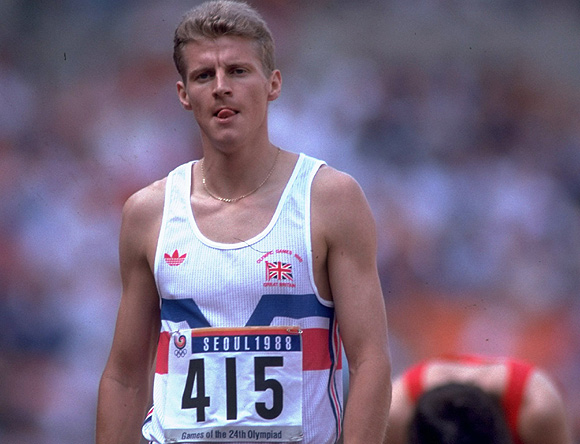
Steve Cram (Britain)
One of the three 'Ss' from Britain – alongside Seb Coe and Steve Ovett – who dominated middle distance running in the 1980s, Steve Cram once held the world record in the three disciplines – the 1,500 meters, the mile and the 2,000 meters.
The Tynesider, among other major achievements, won the gold in 1,500 meters at the inaugural World championships in Helsinki in 1983. Besides, he also won the European Championships gold twice in the distance – in 1982 (Athens) and 1986 (Stuttgart) – and the Commonwealth Games gold thrice – in 1,500 meters in 1982 (Brisbane) and in both 800 and 1,500 meters in 1986 (Edinburgh).
However, his major failure was to win an Olympics gold. Cram finished second behind Coe in Los Angeles (1984) and despite being the favourite in Seoul four years later, a calf injury ensured he could only finish fourth.
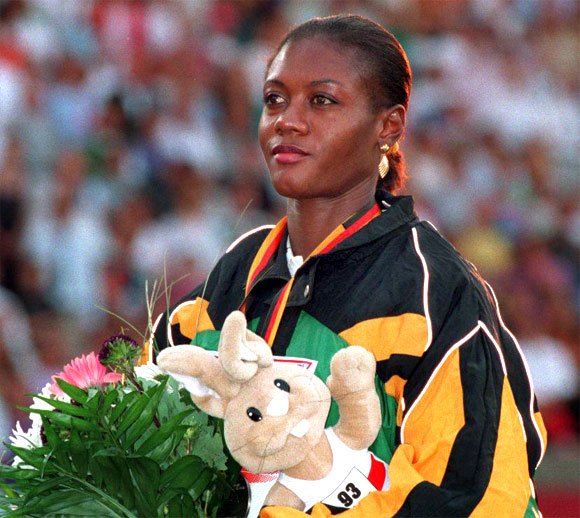
Merlene Ottey (Jamaica/Slovenia)
Merlene Ottey won nine Olympic medals in her career, the most by any woman in track and field history.
However, none of them was gold. Could anyone be more unlucky?
Wait, there's more to her misfortune. At Atlanta she lost the 100 meters final to American Gail Devers by five thousandths of a second.
Ottey also won a record 14 medals at the World championships, three of them gold, and a plethora of medals at the Commonwealth Games.
However, despite participating in a record seven Olympics, the Jamaican who later competed for Slovenia could muster only three silvers and six bronze medals at the quadrennial event.
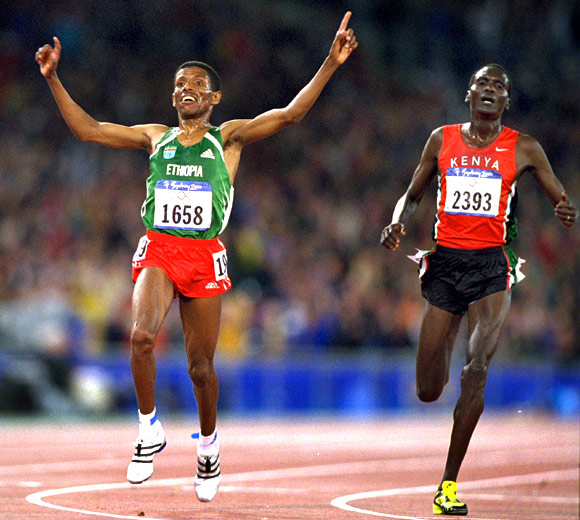
Paul Tergat (Kenya)
Paul Tergat held the world record in the marathon, a timing of 2: 04.55 set in Berlin, for five years, from 2003 to 2007.
He won a record five straight world cross country titles (from 1995-99) and the gold in the World half-marathon championships both in 1999 (Palermo) and 2000 (Veracruz).
Besides, the Kenyan won a number of other titles and set many world records. However, when it came to the Olympics he was denied twice by his major rival.
Haile Gebrselassie had pipped Tergat to the world 10,000 meters title in both 1997 and 1999. And when it came to the Olympics, the Kenyan found the Ethiopian blocking his march to glory.
Not once, but twice. Gebrselassie bested Tergat in the 10,000 meters finals in both Atlanta (1996) and Sydney (2000), the latter loss was painful as the Kenyan missed gold by nine hundredths of a second.

Sonia O'Sullivan (Ireland)
Her first attempt at Olympic glory, in Barcelona, ended in dual failure. Sonia O'Sullivan finished fourth in the 3,000 meters final and failed to qualify for the 1,500 meters final.
Four years later, she came bettered prepared in Atlanta.
The fact that she had won the 5,000 meters World title in Gothenburg a year earlier made her the favourite for the event. However, an upset stomach meant she failed to finish the race. The Irish woman also failed to make the final of the 1,500 meters.
She came into Sydney with two World Cross Country titles under her belt. However, she could only manage silver, behind Romanian Gabriela Szabo.
O'Sullivan qualified for the 5,000 meters final again in the 2004 Games in Athens. However, another bout of illness meant she finished last.
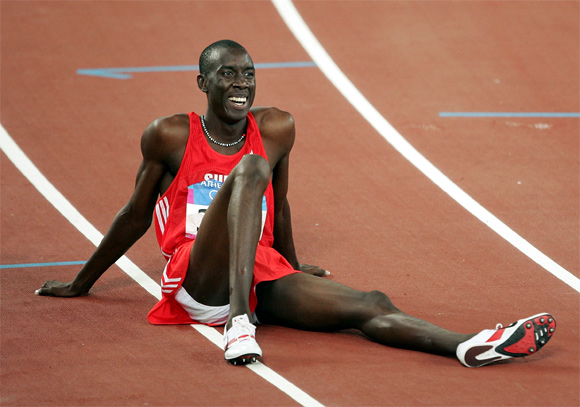
Wilson Kipketer (Denmark)
A three-time World champion, Wilson Kipketer dominated the 800 meters distance in the 1990s.
However, all of the Kenyan-born Danish athlete's attempts at Olympic gold ended in failure.
Since he had moved to Denmark in 1995, and was not yet a full Danish citizen, the Kenyan federation (and the IOC) blocked his participation in the Atlanta Games.
Four years later, German Nils Schumann pipped him to the gold in Sydney.
Finally, in Athens, Kipketer led the race heading into the final stretch but eventually had to settle for the bronze, behind Russia's Yuriy Borzakovskiy and South African Mbulaeni Mulaudzi.
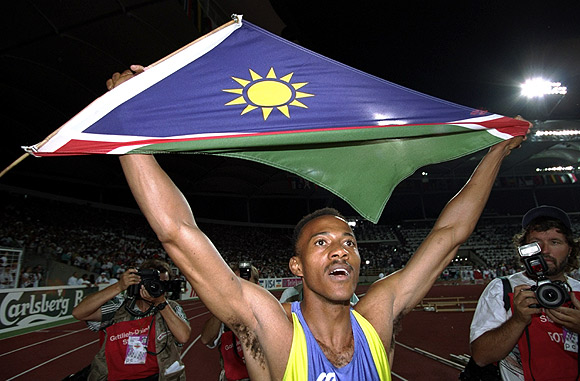
Frankie Fredericks (Namibia)
Four silver medals. No gold. That happened to be Frankie Frederiks's return from the two Olympics he participated in.
The Namibian, who won a handful of medals (including gold) in both the World championships and the Commonwealth Games, had to settle for second place in both the 100 and 200 meters races in both the editions.
In Atlanta, he ran the 200 meters in 19.68 seconds, the second fastest non-winning time in the distance. Unfortunately for him, Michael Johnson was in imperious form in those Games.
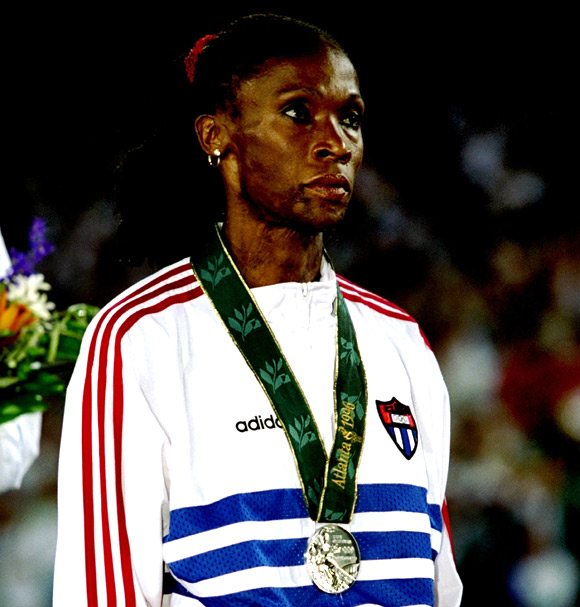
Ana Quirot (Cuba)
A double World champion in 800 meters, Ana Quirot also won a multitude of other medals in the distance.
However, when it came to the Olympics the Cuban was unfortunate.
In the 1992 Games in Barcelona, Quirot finished third behind surprise winner Ellen van Langen of the Netherlands and reigning world champion Liliya Nurutdinova of the Unified team.
Four years later in Atlanta, she finished ahead of Mozambique's Maria Mutola -- who went on to win the event in Sydney. Only Russian Svetlana Masterkova consigned her to a silver medal.

The Brazilian football team
Five-time world champions and favourites for the title ahead of every FIFA World Cup.
They also happen to be eight-time winners of the Copa America and thrice champions in the Confederations Cup.
However, when it comes to Olympic glory, the Brazilian national team still awaits its maiden gold.
The selecao have participated in the quadrennial Games on 11 occasions. They have two silver medals (1984 and 1988) and two bronze medals (1996 and 2008) to show for their efforts.
While they lost to France in the 1984 final, they finished second best to the erstwhile Soviet Union in the decider in Seoul, despite having beaten both Argentina and West Germany -- the two teams that contested the World Cup final in 1986 -- en route.